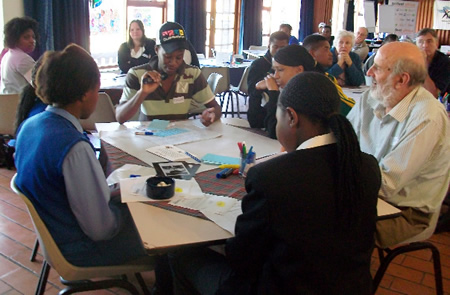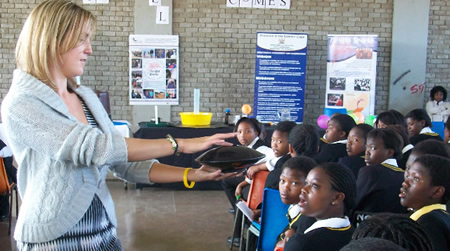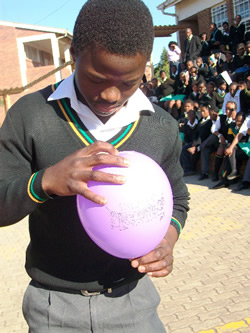| 46% of getS.E.T.go! readers think that the most important benefit of South Africa’s recent participation in the Shanghai Expo, will be the raising of our country’s science & technology profile on the global stage. | |
| 38% opted for “sharing of international best practices in maths & science education”; and 15% for “building an international network of contacts”. |
Almost 21 000 learners from around South Africa and SADC countries participated in the Science Olympiad this year.

By Reyhana Mahomed
Between 2 and 6 August, more than 100 sites around the country celebrated science and its role in economic development, as part of National Science Week (NSW). This year, the Eastern Cape activities were coordinated by the Makana National Science Week Alliance, with one clear goal in mind: attracting learners to careers in science, engineering and technology. Here are just some of the highlights …
Science clubs launched: Five local schools now have brand new science clubs, including Nathaniel Nyaluza, Samuel Ntsika, Mary Water’s and Nombulelo secondary schools, as well as the Hendrik Kanise Combined School in Alicedale. Vera Adams, former director of Scifest Africa, and now part of the Makana Alliance, assured learners and teachers of ongoing support as they set up their clubs.
Thandolwethu Bojo, a grade 11 learner at Nathaniel Nyaluza School and a member of the South African Institute of Aquatic Biodiversity’s (SAIAB’s) “Bright Spark” Achiever programme, was overwhelmed that his school now has science equipment: “Now I can talk to other people and mentor them in the club,” he said.
The art (or is that science?) of theatre: Learners got a humorous glimpse of life on the stage when local theatre company, Beneath the Skin Productions, presented a science play called “Through his eyes”, which sought to deconstruct Charles Darwin’s Theory of Evolution.
Take-a-learner-to-work day: Learners also had the opportunity to see first-hand how science contributes to a country’s economy, by accompanying professionals from various businesses in Grahamstown to work for a day. For many, this was both an eye-opener and an excellent incentive to improve their pass rates.
A World Café – with a difference: To mark the end of NSW 2010, the Makana Alliance hosted a one-of-a-kind science world café – a discussion forum that aims to encourage conversation, debate ideas and brainstorm solutions pertaining to a particular issue. The discussion explored the potential economic benefits drawn from conserving our biodiversity and how individual actions impact on it. SAIAB Managing Director, Professor Paul Skelton, set the scene with his lecture titled “B for Biodiversity - to B or not to B”.
“Today I have become more aware of the importance of reducing the loss of biodiversity,” said Aphiwe Msomi, a learner from Ntaba Maria Secondary School.

Debating biodiversity and its economic benefits over coffee and a muffin, at the
Makana World Café.

Nombulelo Secondary School students look on in awe as Jess Goble creates a
3D image using mirrors and dishes during her science show.
 |
A grade 11 Nyaluza Secondary School student tries the balloon party trick: pushing a wooden skewer through a balloon without bursting it. |
NOTE: the Makana Alliance committee consists of representatives from the Grahamstown District Department of Basic Education (DoE), South African Environmental Observation Network (SAEON Elwandle Node), Scifest Africa and a project of the South African Institute for Aquatic Biodiversity (SAIAB).
